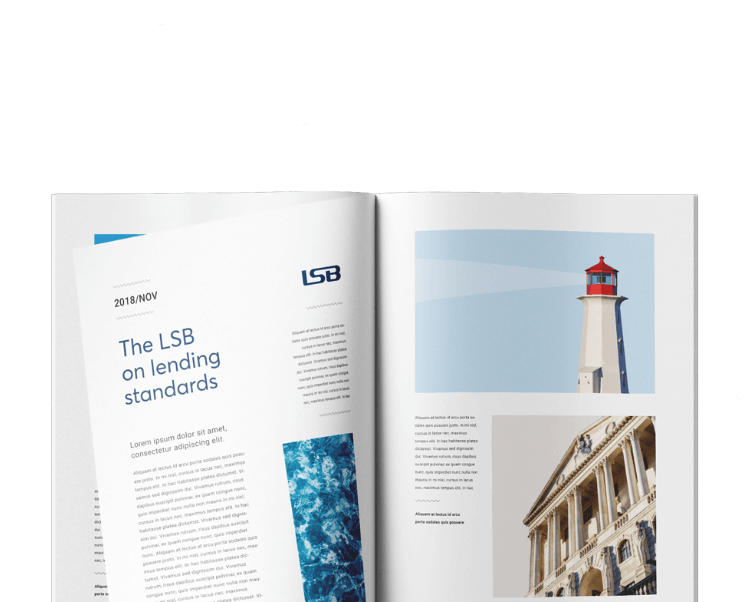
In this new series of blog posts, we will be speaking to members of the Lending Standards Board (LSB) to understand more about what brought them to the organisation and the role they play within it. To begin this, we speak to one of our Compliance Managers (CM), Mark Walker.
CMs are responsible for managing the relationship with a cohort of registered firms. They do this through regular relationship meetings, working on thematic or other compliance reviews and supporting firms through answering queries. A major part of their role is ensuring compliance with the Standards and Codes we oversee, but how do they do this? What does a ‘day in the life’ of a CM look like?
So, Mark, how long have you been at the LSB and what was your background before?
I joined the LSB in March 2020, just at the start of lockdown. It was a strange time to join an organisation; I had only met three people at the LSB during my interview and they are still the only people I have met in person. But I must say, the support I’ve had since joining and the way we are set up to work remotely hasn’t made it feel much more different than starting in a normal office environment.
It was of course a very challenging time for everyone in the country, including for those working at our registered and signatory firms. We had to flex our compliance work to adapt to the changing situation with coronavirus. The good thing was that meant hitting the ground running, so to speak, and that helped me feel a part of the team right from the get-go.
Before the LSB, I had around ten years of experience in compliance roles. The majority of that time was spent at a debt purchaser firm (DPF) and debt collection agency (DCA). That included various management roles within compliance, conduct risk, and oversight.
What does your average day look like?
Well, it would be true to say there isn’t really an average day! However, my role is about ensuring compliance with the Standards and to do this, there are really two main elements – the relationship management (RM) side of things and the compliance monitoring and review side. These do overlap as we use the RM work to, in part, understand how the firm is applying the Standards or Codes.
Usually, the role would involve visiting firms onsite for compliance reviews or RM meetings and so may involve some travel. This is something we will be going back to fairly soon, and I am looking forward to that and being able to learn more about my firms ‘in person.’ When on site you often find you are able to meet with multiple people and get a real feel for the organisation. This in turn creates more open conversations and you can better understand how you can help that registered firm deliver on the Standards and Codes.
Do you have specific firms you are responsible for?
Yes, CMs have around half a dozen firms each across the range of products that we cover. For example, this could include some banks, a building society, credit providers, or DCA/DPFs. Being a self-regulatory body, rather than a trade association or membership organisation, we need to oversee the firms to ensure compliance with the Standards and Codes the firms are signed up to. Having assigned firms and CMs is a key part of this, as it allows you to build a deeper understanding of the business structure and individuals within your firms. The registered firms also know who their CM is and so have a designated point of contact and someone they can work with to ensure compliance.
Can registered firms contact you if they ever need assistance implementing the Standards?
Absolutely, that is a really important part of what we as an organisation offer. We build a relationship with and encourage staff within registered firms to contact us whenever is needed, for example, if they have a question about a new approach or anything else that could affect the Standards and Codes. I’m always pleased when I get an email or call from a firm because it means they are making the most of their registration with us.
If I can’t help them for any reason, I will find the right team who can, for example, our Insight team also work with firms to assist them in various ways. This could include delivering training or sharing what we know about events in the industry and best practice. As a registered firm, you have access to not just your Compliance Manager but all of our Insight function as well.
What do you enjoy most about the role?
I think the exposure you get to a wide variety of different work steams. As a CM you are involved in the Standards (both personal and business), along with such things as Access to Banking, the Contingent Reimbursement Model (CRM) Code, the Credit Card Market Study (CCMS), and more. Alongside this, you’re working with a wide variety of different firms, from the country’s biggest banks to fintechs.
Do you have any tips for anyone reading from a registered firm?
If you work at a registered firm, you should understand that your firm has committed to complying with the Standards or Codes it signed up to. Because of this, it is important that you understand what those Standards do and how best to implement them. This need not take a long time; we have a wide range of resources available to help firms and staff learn more about what we do and how to implement best practice.
For example, I would encourage anyone to not just read the Standards but to read the Information for Practitioners guidance as well. These documents are great as they offer detailed supporting information on the Standards, explaining what is expected and why. I found these invaluable when starting at the LSB as they provide a bit more colour and detail for you to think about.
Secondly, have a look at the Insight work that is regularly published both on our public website and on the secure, firm side of our website. On there are thought pieces and research across every element of what we do at the LSB, and, like the Information for Practitioners, these can help bring the Standards and Codes to life with every-day practical examples.
In our next interview for Day in the Life, we will be speaking to our Insight Manager, Jess Roberts. If there is anyway the LSB can help you or your firm, please contact us at insight@lstdb.org.uk
Download a copy of this blog here.






